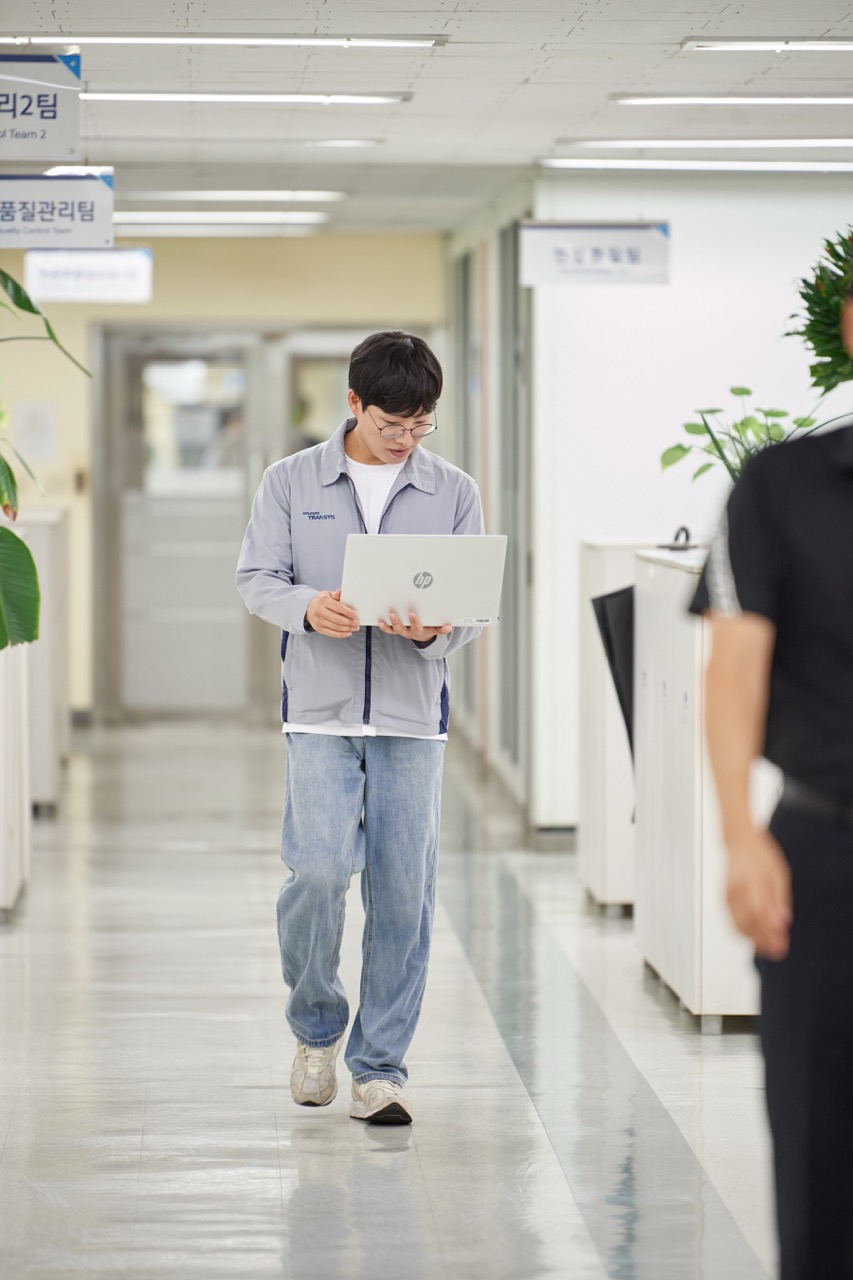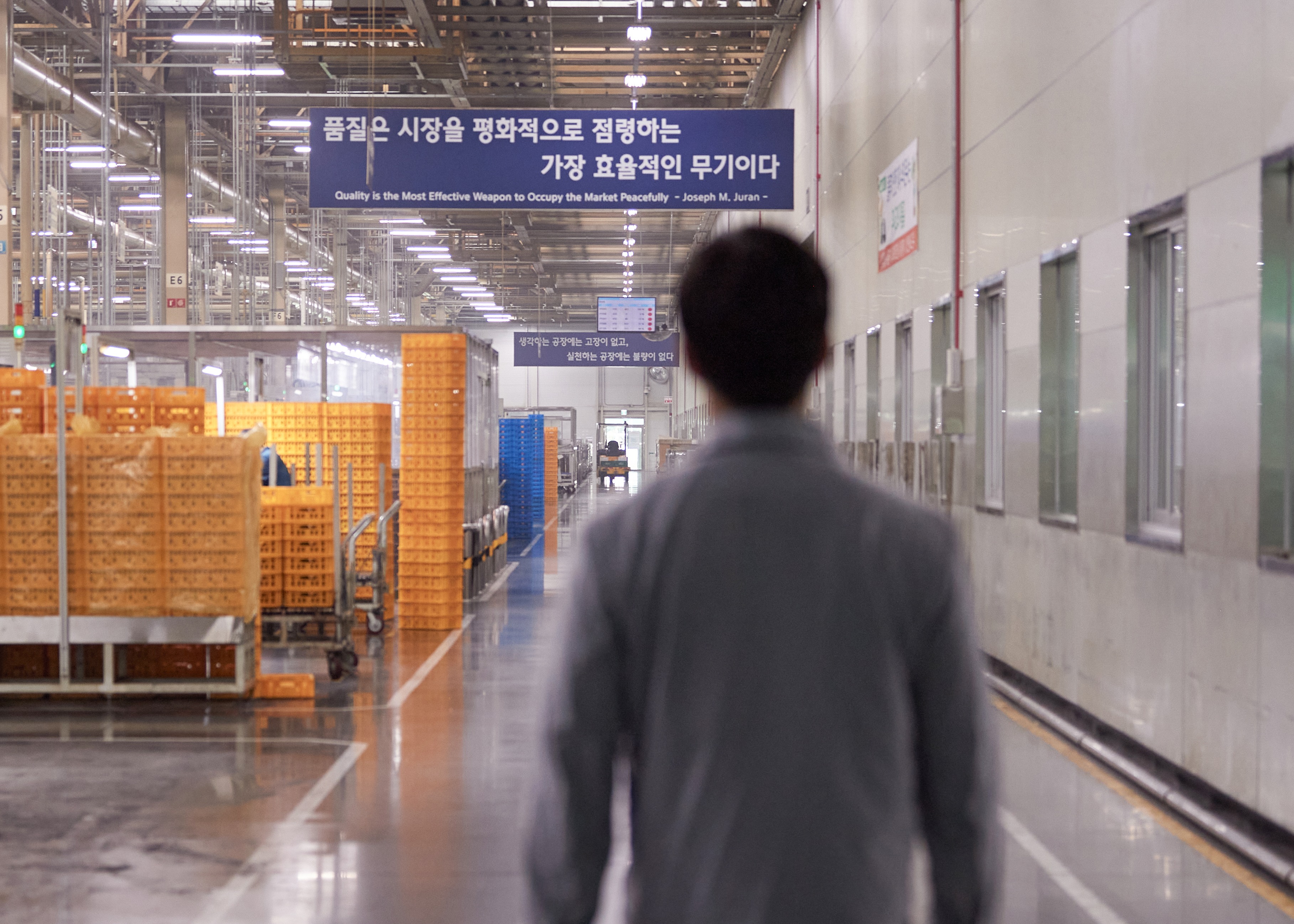-Manager Taesung Hwang, Electric Powertrain Quality Assurance Team 2

Q. What can you tell us about the Quality Division that the Electrification Quality Assurance Team 2 belongs to?
A. The Quality Division at Hyundai Transys is responsible for ensuring product quality across the entire process — from the development and production stages of powertrain and seat products to post-delivery customer support. Quality operations are generally divided into three areas: advance quality, quality control, and quality assurance. Advance quality focuses on the new product development stage, securing quality through pre-inspection, diagnosis, and improvement activities. Quality control centers on the mass production stage, establishing and implementing improvement measures for parts, processes, and materials, as well as monitoring quality indicators. Quality assurance addresses products after assembly into vehicles by examining and resolving quality issues that arise within the warranty period. At its core, quality assurance focuses on analyzing the root causes of customer-reported issues and implementing corrective measures to achieve customer satisfaction.
Q. What motivated you to pursue a career in quality assurance, and what are your current responsibilities?
A. Automobiles are products whose quality customers experience every day, and that quality directly reflects a company’s credibility. I believe that in the automotive industry, a company’s reputation ultimately depends on the quality of its products. I found great meaning in the field of quality because it allows me to take direct responsibility for product excellence, and among its various areas, I wanted to work in quality assurance — where I could be closest to the customer’s voice. My major in Industrial and Information Systems Engineering is also closely related to production and quality, which naturally led me down this career path.
The Electrification Quality Assurance Team 2, which I’m part of, is responsible for ensuring the quality of DCTs (Dual Clutch Transmissions), manual transmissions, and EV reduction gears produced at the Seongyeon Plant. Among these, I’m in charge of DCTs and passenger car manual transmissions.

Q. After gaining hands-on experience, have you found any aspects that were different from what you expected before joining the company?
A. Before joining Hyundai Transys, I thought quality assurance was mainly about analyzing data and making improvements. I assumed that solving visible technical problems would be enough. However, the reality turned out to be much more complex. Even a single quality issue involves numerous discussions and differing opinions among departments such as production, R&D, service, suppliers, and customers. Since each department views a problem from its own perspective and interests, finding common ground often becomes a major part of the job. Through firsthand experience in the field, I’ve learned that communication skills are just as crucial as data analysis.
Q. Wasn’t it challenging to handle issues directly on-site?
A. It was very difficult at first, but over time I realized that it actually suits my personality quite well. I enjoy analyzing and monitoring data in the office to investigate and identify quality issues, but I find even greater satisfaction in personally identifying and resolving on-site problems that can’t be fully understood through data alone.
For instance, when an issue arose with products exported overseas, I traveled on-site to resolve it. Normally, overseas complaints are handled by returning the parts to Korea for analysis, but in this case, the root cause couldn’t
be identified from the parts alone. By visiting the local site, I was able to inspect the actual vehicle, identify the problem, and find a solution. That experience taught me that the more complex an issue is, the more important it is to face it head-on.
Q. It seems you actually turned those challenges into motivation.
A. That’s right. I believe the sense of accomplishment that comes from overcoming difficulties is even greater. In addition to internal communication, our team often faces challenging situations because we handle customer complaints directly. For example, identifying the root causes of various issues and implementing improvements are often directly tied to costs, which makes negotiations with clients particularly difficult. However, I see these moments not just as communication, but as opportunities for persuasion — and I try to approach them with flexibility. I believe that discovering the right balance by considering both technical data and human factors is what makes this job so engaging.



Q. When do you feel most rewarded in your work?
A. Since quality is directly reflected in data, I can clearly feel a sense of achievement through claim rates. One of the first things I do after arriving at work is monitor field claim data from the previous day. I feel most rewarded when the improvement measures developed through careful analysis and discussion lead to a tangible decrease in claim rates.
I began as an intern and formally joined the company in 2021. This year, 2025, marks my first year of promotion eligibility, and I’m grateful to have been promoted. I still have much to learn, but I’m thankful and proud that my efforts have been recognized in a positive light.
Q. How would you describe the teamwork among your colleagues? What’s the overall atmosphere of your team like?
A. I can confidently say that the Electrification Quality Assurance Team 2 has a free and family-like atmosphere. Although each of us is responsible for different items and much of the work is handled individually, our processes are quite similar, so we understand and empathize with one another better than anyone else. Whenever someone faces a challenge, we’re quick to step in and offer help.
There’s also a strong culture of knowledge sharing and mutual learning between senior and junior colleagues. As one of the youngest on the team, I often find myself on the receiving end of that support. When I face various issues — for example, when the root cause of a defect isn’t clear — senior colleagues give me guidance on which areas to examine or recommend materials that are effective in persuading clients. Their advice has been invaluable. Our team is made up of experts, each with unique know-how in quality assurance, and someday, I hope to be the kind of person
who can offer that same support to my younger colleagues.

Q. What is the working environment like at the Seosan Seongyeon Plant?
A. Both in terms of work and daily life, the Seongyeon Plant offers a very satisfying environment. Above all, being able to see the production process firsthand is a tremendous help in my work. Instead of worrying about things at my desk, whenever a question arises, I can simply head to the production line to check it in person. The overall atmosphere at the plant was also quite different from what I had expected. Before joining, I imagined it would be rigid and hierarchical, but in reality, it’s much more open and relaxed.


Q. As a quality assurance manager, what are your future goals?
A. As the shift toward electrification accelerates, I believe quality standards will continue to evolve. Unlike traditional internal combustion engines, electrified components involve entirely new structures and systems, which means that approaches to defect analysis and quality improvement must also be fundamentally redefined. In the midst of this transformation, the role of quality assurance itself will also change. It will no longer be limited to resolving issues, but will expand to establishing quality management processes that align with new technological environments.
Currently, the powertrain sector is undergoing its most significant transformation, centered on electrification. In line with this shift, Hyundai Transys is broadening its business scope and continuously taking on new challenges. I hope to first build expertise in internal combustion systems and gradually expand my responsibilities to electrified products. My ultimate goal is to grow into a quality expert with strong competitiveness across all areas of the powertrain field, building on the hands-on experience I’ve gained on the production floor.

Q. Lastly, if you were to describe the company and your work in one phrase, what would it be?
A. I would describe it as “a place where you discover your own value and grow.” Before joining the company, I didn’t fully know what my strengths were. By working here, I’ve come to understand where my abilities and potential truly lie. In that sense, I believe the quality assurance role serves as a foundation for continuous growth. Solving various problems and improving processes along the way constantly encourages me to reflect on myself. Going forward, I hope to keep refining my strengths and contribute to upholding Hyundai Transys’s commitment to quality.
'Global' 카테고리의 다른 글
| The Ultimate Stage of Powertrain System Development (0) | 2025.12.04 |
|---|---|
| Designing the Spaces and Experiences of Future Mobility Through Technology (0) | 2025.11.04 |
| The Art of Turning Design Blueprints into Products (0) | 2025.10.31 |
| The Power of DX: Transforming Culture with Technology (0) | 2025.09.01 |
| ESG: The Driving Force for Both Myself and Hyundai Transys (0) | 2025.08.25 |



